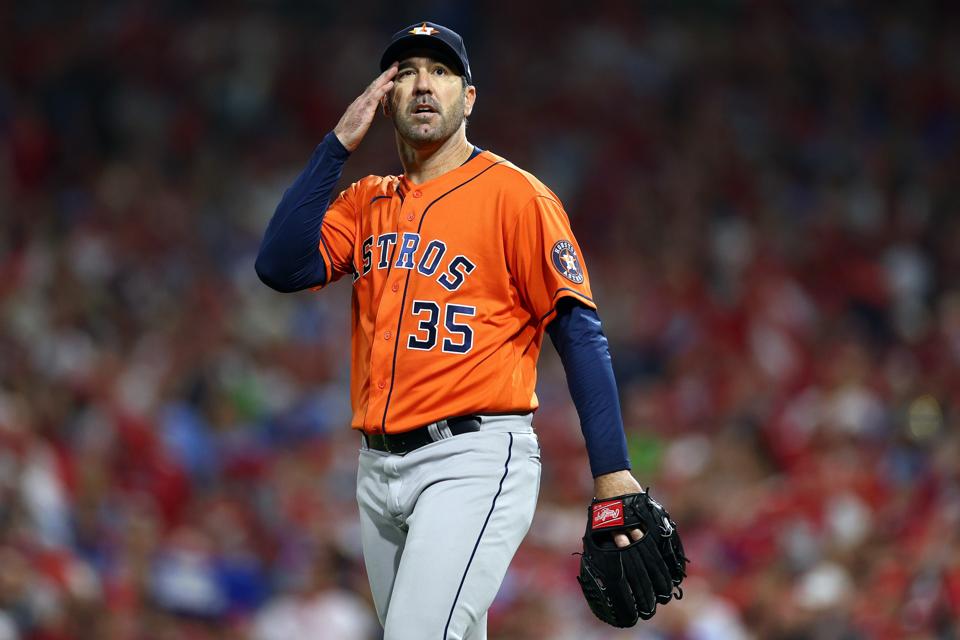With Adam Wainwright retired and Rich Hill unsigned, only three 40-year-olds – all of them pitchers — remain active in the major leagues.
Justin Verlander, 41, is a three-time Cy Young Award winner anxious to resume his quixotic quest for 300 victories (the injured right-hander of the Houston Astros has 257).
Charlie Morton, 40, pitched 5 2/3 scoreless innings Monday for the Atlanta Braves to beat the Chicago White Sox at Chicago’s Guaranteed Rate Field.
And Jesse Chavez, a 40-year-old who just started his fifth stint with Atlanta, bailed out Braves lefty Max Fried over the weekend when the 2023 All-Star couldn’t get out of the first inning in Philadelphia.
Chavez says he’ll retire after this season and Morton may do likewise. But Verlander is on record as stating he hopes to emulate Nolan Ryan, pitch deep into his 40s, and become the first 300-game winner since Randy Johnson in 2009.
Slowed by a shoulder injury this spring, Verlander started the season on the injured list. But he’s usually a workhorse who has led his league in games started five times.
He also has plenty of incentive to last as long as he can; he’s in the second year of a two-year, $86.76 million deal that he signed last off-season with the Mets. He was traded to Houston, where he pitched previously, on the Aug. 1 trade deadline.
Verlander averages 17 wins per 162 games – the length of a major-league season – and has led his league in wins four times. Last year, dividing his time between the Mets and Astros, he went 13-8 with a 3.22 earned run average, then went 1-1 in post-season play.
Overall, he has 17 wins in playoff or World Series games.
Time and tradition are working against the pitcher, however. More prone to injuries as his athletic age advances, he is also subjected to the current baseball practices of five-man rotations and pitch counts that often stop at 100 per game – at least for mortal men. No other pitcher is close to his win total.
Morton, for example, has pitched 16 seasons but has only 130 victories, including the one he collected in dreary Chicago Monday. A curveball specialist, he’s won seven post-season games.
The soft-spoken New Jersey native ranks only fourth on a starting staff that also features Spencer Strider, Max Fried, and newcomer Chris Sale but he ranks first in terms of experience. A 14-game winner last season, Morton serves as a second pitching coach in sharing his expertise with his younger colleagues. It’s part of the reason the Braves pay him $20 million a year.
Chavez, who started 2024 spring training on a minor-league deal with the Chicago White Sox, had such a poor exhibition season that he drew his release just before camp closed. But the Braves were quick to snap up the bespectacled veteran, who has been something of a good-luck charm during his four previous stints with the team.
A Californian who turns 41 in August, he’s 11-7 with a 3.01 ERA with the Braves, helping the team win the World Series in 2021, but otherwise the owner of a 50-63 lifetime mark and 4.30 ERA. That’s not pretty even for a relief pitcher who throws several innings at a time.
He had a sparkling 1.56 ERA in 36 games for the Braves in 2023 but spent time on the injured list after he was hit by a comebacker during a game.
Chavez is a relative bargain at $1.2 million – especially if he stays healthy. He won’t blow hitters away but he will throw strikes. In his 17-year career, he’s averaged 8.2 strikeouts per nine innings but only 2.8 walks over that same stretch.
It’s still possible, of course, that a desperate contender will consider Hill, a 44-year-old veteran of 19 seasons with a 90-73 record and 4.01 ERA. He was 8-14 last year, pitching for Pittsburgh and San Diego, and has been traded or signed almost as often as Chavez.
Lefties who can start or work long relief often last longer – just ask Jamie Moyer, a junkballer who won 269 games before hanging up his well-worn spikes.
Wainwright, the long-time bellwether of the St. Louis Cardinals, won 200 games before he retired at age 41 after the 2023 season. He spent his entire career with the Cards, teaming with catcher Yadier Molina in a battery that could eventually reach Cooperstown.
Verlander is headed in that direction too, whether or not he reaches the 300 Club.
For some pitchers, life may not begin at 40. But it doesn’t end there either.

